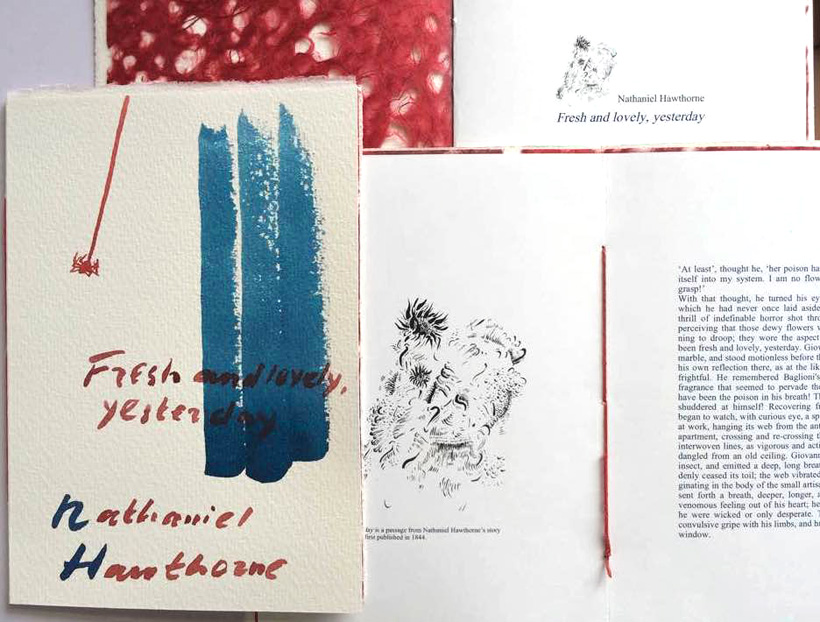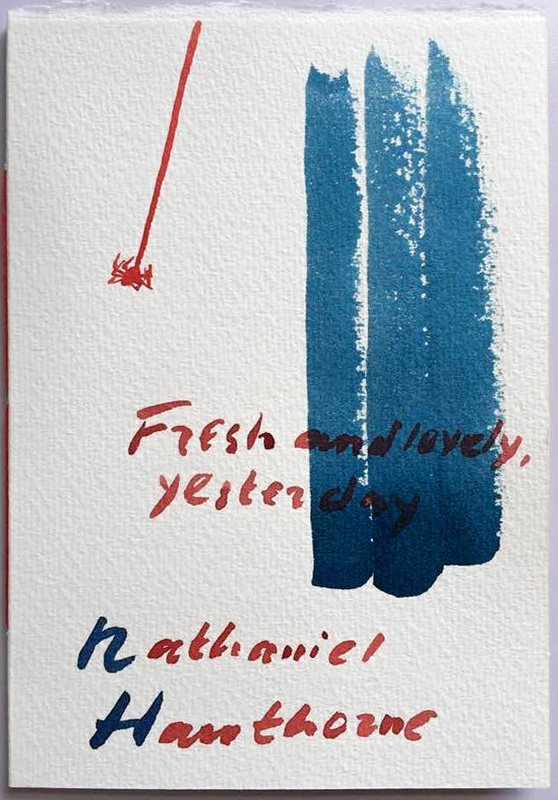
Author: Nathaniel Hawthorne
Publisher: Sea Urchin
Year: 2016
Size: 210 x 148 x 4 mm
Language: English
Artwork: Ben Schot
4 pages laser printed on 200 gr paper, flyleaf of red Japanese hemp paper,
Binding: Red yarn pamphlet stitch
Cover: watercolour on 300 gr. Saunders Waterford
Limited, numbered and hand made edition of 15
Nathaniel Hawthorne (1804-1864) was a short story writer and novelist who is generally regarded as one of the leading representatives of American ‘Dark Romanticism’. Hawthorne was born in Salem, Massachusetts and descended from a family of Puritan settlers of the Massachusetts Bay Colony, one of the earliest and largest New England colonies. His ancestor John Hathorne was a harsh and unrepentant magistrate at the notorious Salem witch trials, in which twenty people were executed and five died in prison. To distance himself from his fanatical ancestor Nathaniel changed his surname to Hawthorne, but his Puritan lineage remains apparent in the themes of his allegorical works, many of which centre on original sin, the supernatural, inherent evil, damnation and redemption. A gifted and prolific prose writer, Hawthorne explored these themes with deep psychological insight in short stories that show influences from the German Romanticism of E.T.A. Hoffmann and Ludwig Tieck.
 Hawthorne became affiliated with the Transcendalists through his fiancée Sophia Peabody, with whom he briefly joined the experimental utopian community Brook Farm in 1841. By that time Hawthorne had already published seven issues of his hand written newspaper ‘The Spectator’ and had contributed short stories to various magazines, which had been compiled in the volume ‘Twice-Told Tales’ in 1837. In 1842 Hawthorne and Sophia married and settled in The Old Manse in Concord, Massuchusetts, which had been built for the transcendentalist writer Ralph Waldo Emerson’s grandfather and had Ralph Waldo for a neighbour. At The Old Manse Hawthorne led a reclusive life and wrote most of the allegorical short stories that would be collected in ‘Mosses from an Old Manse’ in 1846. Herman Melville wrote that these stories were “shrouded in blackness, ten times black” and dedicated his ‘Moby-Dick’ to Hawthorne. One of the stories in ‘Mosses from an Old Manse’ is ‘Rappaccini’s Daughter’, an allegorical tale about a poisonous girl and her ruthless father, an excerpt of which has now been re-published by Sea Urchin. The beautiful Sea Urchin chapbook ‘Fresh and lovely, yesterday’ has been made by hand in a limited edition of 15. All artwork by Ben Schot. Be quick to order a copy. Nothing lasts. Everything must go.
Hawthorne became affiliated with the Transcendalists through his fiancée Sophia Peabody, with whom he briefly joined the experimental utopian community Brook Farm in 1841. By that time Hawthorne had already published seven issues of his hand written newspaper ‘The Spectator’ and had contributed short stories to various magazines, which had been compiled in the volume ‘Twice-Told Tales’ in 1837. In 1842 Hawthorne and Sophia married and settled in The Old Manse in Concord, Massuchusetts, which had been built for the transcendentalist writer Ralph Waldo Emerson’s grandfather and had Ralph Waldo for a neighbour. At The Old Manse Hawthorne led a reclusive life and wrote most of the allegorical short stories that would be collected in ‘Mosses from an Old Manse’ in 1846. Herman Melville wrote that these stories were “shrouded in blackness, ten times black” and dedicated his ‘Moby-Dick’ to Hawthorne. One of the stories in ‘Mosses from an Old Manse’ is ‘Rappaccini’s Daughter’, an allegorical tale about a poisonous girl and her ruthless father, an excerpt of which has now been re-published by Sea Urchin. The beautiful Sea Urchin chapbook ‘Fresh and lovely, yesterday’ has been made by hand in a limited edition of 15. All artwork by Ben Schot. Be quick to order a copy. Nothing lasts. Everything must go.


